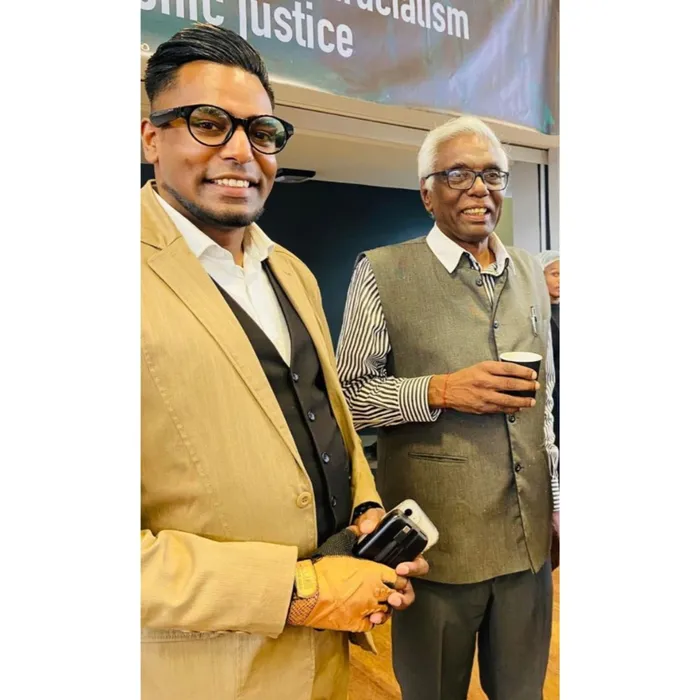Natal Indian Congress celebrates 130th anniversary

Reflecting on the 130th anniversary of the Natal Indian Congress (NIC) held recently, (L to R) lawyers Previn and Jerald Vedan spoke about the NIC and their hopes for the future. They say the NIC should be revivedPicture: SUPPLIED

The Natal Indian Congress (NIC) celebrated its 130th anniversary on September 8 at the Sastri College Hall in Durban. Father and son, Mr Jerald, 68, a former activist and Mr Previn Vedan, 32, both Durban based lawyers shared their thoughts on the NIC.
Passionate about their deep connection to the history and ideals of the NIC, Previn said his dad has been an active community activist throughout his life and a supporter of the NIC.
“From a young age, dad participated in the NIC’s programmes and contributed to various civic movements, including the rates boycott in Shallcross and the anti-Tricameral campaigns. These efforts were a part of a larger struggle for equality and justice. My father is a former councillor in our area and so was I,” said Previn. “We both acknowledge that South Africa has faced significant challenges, particularly due to the greed and corruption of certain individuals who have exploited their positions of power. The end of oppression and the enshrinement of the principles of the Freedom Charter into our laws has set us on the path to help transform South Africa into a more just and equitable society.”
Jerald sees the NIC as having been a vital force in fostering leadership, guidance, and a sense of belonging within the Indian community.
“I believe the NIC should be revived as a think tank, a space for intellectual debate and action, not just for the betterment of the Indian community but for the whole of South African society,” said Jerald. “I see the NIC as a tool for promoting social cohesion, helping preserve the rich cultural, linguistic, and traditional heritage of our community while blending it into the broader South African identity. South Africa is a unique mosaic of diverse cultures, and while we live together relatively peacefully, we must continue striving to eliminate poverty, crime, and corruption. By working together, we can foster a peaceful, harmonious, and law-abiding society in this beautiful country we all call home.”
Jerald added that attending the 130th anniversary of the NIC was more than just an event—it was a pilgrimage to a time of struggle, sacrifice, and undying hope. Jerald spoke of being greeted by faces etched with history, many of them grey-haired warriors who had given the best years of their lives to the cause of liberation. These were the stalwarts who had faced the iron bars of prison, whose resilience had fueled our freedom, and whose sacrifices carved the path to a democratic South Africa, said Jerald.
“Amid the warmth of nostalgia, the speeches of giants like Mr Mac Maharaj and ex-President Mr Kgalema Motlanthe echoed a sobering truth: despite the triumphs of the Mandela era, the dream of a ‘better life for all’ has faltered. Greed, corruption, and crime have eroded the foundation we worked so hard to build,” Jerald said.
As he stepped out into the cold, rain-soaked streets of Durban that night, the city’s neglected state seemed to mirror the sense of disillusionment he felt. But this cannot be where the story ends. The NIC must be revived—not as a relic of the past, but as a think tank for the future, where Indian South Africans contribute to ensuring that the mistakes of the past are not repeated, Jerald said. Our Constitution must be honoured, and the dream of a South Africa where all races live free of poverty, violence, and discrimination must be reignited.
Previn added that growing up, his father often spoke of the heroes of the struggle, men and women who had risked everything for the cause of liberation.
“I had the privilege of meeting many of them at the NIC anniversary. As I stood in the historical precincts of South Africa’s first high school for Indians, Sastri College, the words of the speakers lit a fire within me, a flame of pride in the NIC, the UDF, and the Black Consciousness Movement. These movements, during the darkest days of apartheid, kept the torch of democracy burning when the liberation movements were banned,” Previn added.
He said while the setbacks have been severe, the message is clear: we must regroup, rethink, and push forward toward a South Africa that is fair, free from greed and corruption, and unified in purpose.
“Social cohesion is essential. I believe that Indians, Africans, Coloureds, and all other South Africans must overcome the barriers erected by apartheid. We need to actively engage in programmes, projects, and intercultural exchanges that build trust and understanding,” Previn said.
“While I deeply respect the wisdom of my elders, I see the future of the NIC in a new light. Perhaps it is time for the NIC to serve as an advisory body, while the younger generation takes up the mantle. We are ready to forge new paths, to pave the road to a brighter, more inclusive future. The baton has been passed—now is the time to seize the day, to seize our destiny.”
Related Topics: